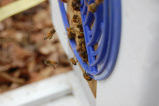|
A very popular question we receive from people is " Does Honey Go Bad?"
Honey is a natural food substance made by honey bees. It is a sweet, viscous liquid that is made from the sugary secretions of plants (floral nectar) or from secretions of other insects (such as honeydew), by honey bees and some related insects. Honey is stored in wax structures called honeycombs. All SeaBee Honey is produced by our own honeybees and is made up of the floral nectars found in New Hampshire. Honey has been used for food and medicine for centuries. It is a good source of antioxidants and has antibacterial and antifungal properties. Honey is also a popular sweetener and flavoring agent. Many people wonder if honey ever goes bad. The answer is yes and no. Honey does not spoil in the same way as other foods, such as fruits and vegetables. It does not contain bacteria or yeast, and it can last for years or even decades if it is properly stored. However, honey can change in color, texture, and flavor over time. This is due to the natural aging process of honey and is not a sign that it has spoiled. There are a few things that can cause honey to go bad. If honey is exposed to moisture, it can ferment and become sour. Honey can also spoil if it is stored in a warm environment or an environment where moisture can get into the honey. If you see any signs of spoilage, such as a change in color, odor, or taste, it is best to discard it. One way to tell if your honey is bad is by smelling it. Any strong off flavors will indicate if the honey has fermented. If honey has a sour or off-putting odor, it is best to discard it. If you store honey properly, it will last for years or even decades. We recently found an old bottle of our honey that was from 2006. It had crystallized but when we gently warmed it up to reliquify, the honey was as delicious as it was from that 2006 harvest.
0 Comments
Leave a Reply. |
Details
SEABEE HONEY BLOGAuthorA beekeeper in New Hampshire [email protected] Archives
December 2023
Categories
All
|

 RSS Feed
RSS Feed